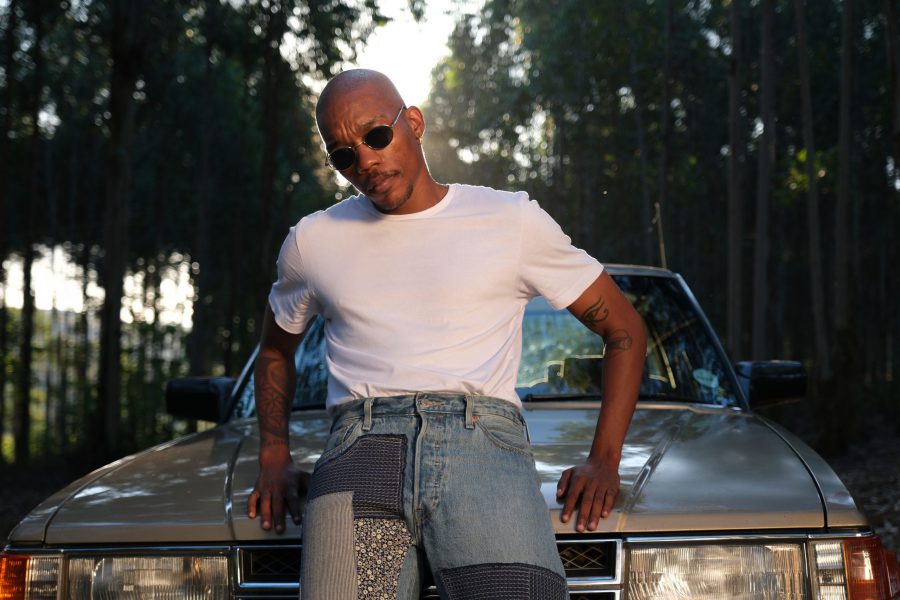INTERVIEW: Artist-producer Muzi goes on a South African road trip

Muzi, courtesy Earl Abrahams.
Many music records carry a thematic vehicle that bridges songs, whether an artist planned it that way or not. For South African electronic singer-songwriter and producer Muzi, that vehicle was more literal than most: his late father’s Toyota Cressida.
uMUZI
Muzi
Fool’s Gold, out now
Get the album on Amazon Music.
His new album, uMUZI, delves into parts of his childhood he’d long repressed, his role as a son and his relationship with his parents, as well as his own experience with fatherhood. The constant from his own childhood to having a daughter of his own had a throughline: the music he’d picked up in his youth and the experience he had while riding in that car.
In Muziwakhe McVictor Mazibuko’s memories, he can still picture his dad blaring music from the Cressida’s speakers as he washed it in the driveway, or taking young Muzi on road trips through South Africa’s beautiful landscapes.
“When I was a kid, it would just be really nice to get to experience new things with your parents through these road trips that they take,” Muzi said in a recent video call from his current home in Johannesburg, between load-shedding brownouts. “That’s how they started dating, when it was their love language, and then they sort of put me into it when I was born. I got to get a sense of my parents’ personalities through the music they liked, through the stuff that they were listening to.”
After the 32-year-old’s daughter, Zeno, was born in 2019, his friends suggested he take her on rides so she could also experience her land. That’s something the member of the Zulu tribe had not done since his own childhood. During these trips, father and daughter got to know each other on a primal level: their personalities and instincts.
Also, his own childhood memories began to bubble up and percolate.
“I didn’t really know I was making an album until I started doing those road trips,” he said. “It became very clear that this was gonna be an album about family, but more so about fatherhood, where I speak about my own father, but also about my own fatherhood moving forward. I have a choice on how I lead my life moving forward that my past doesn’t really control me in that sense.”
Muzi was born and grew up in Empangeni, a small rural town in Indian-Ocean-facing KwaZulu-Natal. That’s about 100 miles north of Durban, a metropolitan beach-side city, and about 200 miles south of the border with Mozambique. He and his four older siblings grew up poor, he said, but they didn’t know it because of the love in their home.
The family was musically inclined. His mother had once almost gotten a record contract, he said, while his dad collected vinyl records (much of them electronica), and his brothers got into making hip-hop. Traditional Zulu music also played a significant part in his upbringing, and all these influences form the basis of the music he makes now.
But Muzi first followed his brothers by getting into hip-hop at 11. Two years later, the boys’ mother bought them a used computer, and his brothers’ friend installed production program FL Studio (FruityLoops) on it.
“I just got hooked, ‘cause the only thing that I was kinda interested in was just movies and academics at the time. I just liked studying and all that,” he said. “I was very insular as a kid. I wouldn’t speak. And then the bug caught me, ‘cause I liked the idea that something could be in my head, and I had a chance of making it real. That’s how the music journey starts happening.”
His dad passed away when Muzi was 11. He’d been sick for a while, but to Muzi it was abrupt because his father kept the illness from him.
“I used to stay at my mom’s, so I didn’t really see him often,” he said. “Because of how he wasn’t there, I sort of created this image of him in my head that was like this superhero of mine. … Afterwards, I don’t really know what relationship we had. The relationship was more so created around the stories my mom would have about him. … There was just too many gaps, too many things that maybe I didn’t even wanna face.”
Muzi faces the loss of his dad head-on on uMUZI.
His first plan was to pursue academics, and at 17 he went to med school in Durban, yet by then, he and some friends had started a hip-hop collective, inspired by Kid Cudi’s emotive tracks. What he didn’t like about the experience was the rules the members had agreed on about the types of music they could and couldn’t make. So he left to make his own music and chose electronica as the primary medium. To him it felt like it had the least amount of rules and allowed him to incorporate all of his influences.
This was in 2010, when he also decided that he wanted to make electronic beats and sing over them in Zulu. At first, the beats were harsher and more bass-driven, as he was listening to the likes of Skrillex, Diplo, Justice and A-Trak.
He also started DJing after reading that DJs introduce people to new music.
“So I was like, ‘Oh, I could just introduce the crowd to my songs,’” he said.
One of those songs, “Nizogcwala,” got him a publishing deal in 2015. Suddenly, he went from having no money to having some money. After reading that Berlin was a center for electronica, he moved there for a couple of years, during which he released his debut album, 2016’s Boomshaka, a collection of electronic songs with Zulu folk influences like mbaqanga and maskandi.
But after performing a show in Kenya, Muzi realized that the music he wanted to make needed to be made at home. So he returned to South Africa, and rather than making electronic music through an African lens, he started making African music through an electronic lens.
His mother started playing him the songs he’d heard since his childhood, listening in his dad’s car, and realized that those records from the ‘70s and ‘80s were a form of electronic music—with artists building songs around synths and drum machine loops.
“I like being able to hear all these electronic genres, but then, seeing how I view them from being a Zulu guy from Empangeni. That became my sound,” he said. “I started seeing myself as bridging the gap between all those artists that were making music then that maybe didn’t have the same opportunities that I have now. It felt like I wanted to stand on their shoulders in a way and continue that thing of fun, love, positive, emotional music through nice beats.”
His 2018 sophomore album, Afrovision, struck a chord with listeners and music industry professionals—his first significant success. It presented his vision for how African music could sound while delving into his love for his family and his country. In many ways, every record he’s made since has followed in this path.
He named and dedicated 2019’s Zeno to his newborn daughter. But even before COVID-19 hit the following year, he faced tragedy with the loss of his mother after an illness in January.
“I started my year with the worst news. So when COVID happened, I was just already numb, pretty much,” he said. “She had been sick for a while, but at least I was there to know that, and I was there for her.”
The same year he released a six-song EP, Mama, during which he channeled his grief. He views the next LP, Interblaktic, as his “phoenix” album—proof to himself that he can press on after his unmeasurable loss.
His work got the attention of one of his influences, A-Trak, who reached out over Instagram and later signed him to his Fool’s Gold Records, which released uMUZI in October. The record connects all of his previous ones, he said, and allowed him to articulate his thoughts and emotions about his family in a way he hadn’t been able to before.
“When I lost my mom and both of them were gone, I felt like I had to create a healthier foundation for myself as a human being in the world, and the first thing was me facing some truths,” he said.
While his road trips with his daughter in the Cressida informed the album, his route was set in stone after completing rhythmic, percussion-led tune “Light.” In a mix of Swahili and English, he sings to his mother and questions his father’s misgivings: “I grew around/ Some things that weren’t meant to be seen by a kid/ As long as I’m around you/ Ain’t no struggling mama; we were there for each other/ He was never ‘round me/ He was only a father by title … / Even today I needed him.”
“I wanted to make an album that reminded me of my parents, but also an album that spoke on healing from all of that stuff,” Muzi said. “There’s still too many things I was holding onto that my creativity just wanted to let out. After I wrote ‘Lights,’ I realized that I’d healed a lot more than I thought just because of the things I was able to articulate in that song.”
Elsewhere on the album, Muzi writes about his parents’ first date on “eMtunzini,” details his relationship with his father even more on “Timer,” the difficulties he’s faced himself on “Problems” and his first love on “Queen.”
He blends English with Zulu fluidly and said he switches to his native tongue when English doesn’t offer the level of depth necessary. It allows him to get “into the soul” of his intentions, he said. On a translated lyric sheet, short phrases in Zulu often require one or two sentences of explanation in English.
The album includes a few guests, including Coldplay’s Chris Martin, who also sings in both English and Zulu on “Queen.” Martin and Muzi have become friends over the last half-decade. In 2019, Coldplay was playing at the annual Global Citizen poverty-fighting concert, which was held in South Africa that year, and the two met at a mutual friend’s recording studio there and had a jam session together.
A few months later, Martin surprised Muzi after the latter’s set at a Paris music festival and asked him to remix a Coldplay song, “Orphans.” That someone of Martin’s stature liked his music amazed Muzi, and the admiration went both ways. Muzi said he connected with the emotional impact of Coldplay’s music in a way that extended past sonics—he loves Linkin Park and Daft Punk for the same reasons.
The same year, Martin wrote a remix of a Muzi song, “Sondela Forever.” Since then, they’ve checked in on each other every few weeks.
“I get to ask him questions about the industry, how to do things or how to move forward, or how to grow as an artist,” Muzi said. “We’ve sort of built a really good friendship.”
As he was writing “Queen,” Muzi asked Martin to record the vocals because he was hearing his voice on the track—even though the lyrics were primarily in Zulu. But Martin was up for the challenge. After a few calls where they worked on enunciation and the meaning of the words, Martin sent him his take.
“He just nails it,” Muzi said.
Follow editor Roman Gokhman at Twitter.com/RomiTheWriter.


